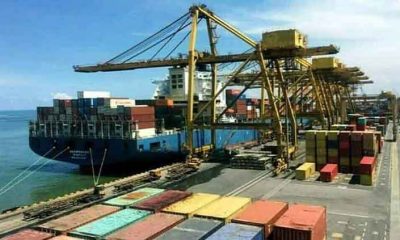World
Gabon coup leader eyes seven-year mandate in presidential vote

Gabon’s coup leader Brice Oligui Nguema is looking to cement his grip on power as the oil-producing Central African nation holds a presidential election on Saturday that analysts expect to be a one-sided affair.
Nineteen months after overthrowing President Ali Bongo, whose family ruled Gabon for more than half a century, Nguema, 50, has pitched himself as a change agent cracking down on the corrupt old guard.
In the capital, Libreville, turnout appeared higher than during the 2023 election that precipitated the coup, when Bongo was named winner of a third term in a process the opposition denounced as fraudulent.
Casting his ballot at a school in the city centre, Nguema said the line outside was evidence that “Gabonese have regained confidence in the election”, adding that it was “transparent”.
Lionel Ekambou, a nurse, woke up early Saturday to vote for Nguema, who has been interim leader since spearheading the coup as an army general.
“His social project meets my expectations and, I am convinced, will contribute to building a better future,” the 28-year-old said.
Crisscrossing the country in a baseball cap bearing his “We Build Together” slogan, Nguema vowed to diversify the oil-reliant economy and promote agriculture, industry and tourism in a country where a third of the population lives in poverty.
Yet not everyone believes Nguema, a former aide-de-camp for Ali Bongo’s father Omar Bongo, who served as president for more than 40 years until his death in 2009, represents a genuine break with the past.
“He sold us a dream,” Libaski Moussavou, 34, told Reuters before casting his ballot, accusing Nguema of surrounding himself with Bongo-era holdovers “whom the Gabonese people decried”.
Nguema’s main challenger is Alain Claude Bilie By Nze, who was serving as prime minister under Ali Bongo before the August 2023 coup, the eighth in West and Central Africa since 2020.
Nze, 57, voted Saturday in his hometown of Makokou. In a video sent to the media by his campaign, he expressed concern that unused voter cards left at polling stations could be used to stuff ballot boxes.
Nze has tried to distance himself from the Bongo family while challenging Nguema’s fitness for the presidency, telling Reuters this week that military men should “go back to their barracks”.
HEAVY FAVOURITE
Analysts say Nguema’s status as the frontrunner comes from a sense that people were broadly happy with the coup and him being the most visible candidate during the campaign.
Nze’s close ties to the old government – which was accused by critics of vote-rigging that it denied – also undermine his warning that Nguema poses a threat to Gabonese democracy, said Florence Bernault, a historian of Central Africa at Sciences Po.
“He doesn’t seem to be very well placed to criticise,” Bernault said.
Polls are scheduled to close at 6 p.m. (1700 GMT), with the result expected on Sunday. The winner will serve a seven-year term, renewable once.
Nearly 900,000 voters are registered to cast ballots at polling stations across the densely forested and sparsely populated country of around 2.5 million people. An additional 28,000 are registered to vote abroad.
Gabon’s economy grew by 2.9% in 2024, up from 2.4% in 2023, driven in part by infrastructure projects and commodities such as oil, manganese and timber, according to the World Bank.
But many voters told Reuters they were mostly concerned about basic services, citing power cuts that plague the capital.
“We talk about it every day,” said 40-year-old electrician Herve Regis Ossouami.
“I don’t know a Gabonese person who would say they don’t want water and electricity.”
World
Malaysian PM says to meet Myanmar junta head in Bangkok

Malaysian Prime Minister Anwar Ibrahim said he will meet the head of Myanmar’s junta in Bangkok this week to push for the extension of a ceasefire between the military government and rebel groups to help earthquake relief.
As the chair of the regional ASEAN bloc this year, Anwar said the meeting with Senior General Min Aung Hlaing on Thursday was being held on humanitarian grounds, as there continued to be no formal engagements between Myanmar and the Association of Southeast Asian Nations.
Myanmar was hit by a devastating earthquake last month that killed thousands and caused significant damage.
“I thank General Min Aung Hlaing for responding positively to our call… During my meeting with him on April 17, I will push for the ceasefire to be extended,” Anwar said on Monday.
Myanmar has been in turmoil since early 2021, when the military’s overthrow of an elected civilian government sparked a civil war.
The junta and rebel groups have announced unilateral ceasefires to support the quake relief, but have accused each other of violating the agreements.
ASEAN wants Myanmar to implement the bloc’s five-point peace plan to halt the fighting, and has barred the ruling generals from attending its meetings over their failure to comply.
Anwar said Malaysia will continue its humanitarian assistance for the earthquake-hit country through a temporary field hospital run by the Malaysian Armed Forces.
Min Aung Hlaing attended a summit in Bangkok earlier this month, a rare foreign trip for the leader who has been largely shunned internationally since the 2021 coup.
World
Russia claims its deadly attack on Ukraine’s Sumy targeted military forces as condemnation grows

Russia on Monday claimed its deadly missile attack on Ukraine’s Sumy that killed and wounded scores including children had targeted a gathering of Ukrainian troops, while European leaders condemned the attack as a war crime.
Ukrainian officials have said two ballistic missiles on Palm Sunday morning hit the heart of Sumy, a city about 30 kilometers (less than 20 miles) from Ukraine’s border with Russia, killing at least 34, including two children, and wounding 119. It was the second large-scale attack to claim civilian lives in Ukraine in just over a week.
Asked about the attack, Kremlin spokesman Dmitry Peskov said Russia’s military only strikes military targets. Russia’s Defense Ministry said the strike targeted a gathering of senior military officers and accused Kyiv of using civilians as shields by holding military meetings in the city’s center.
The ministry claimed to kill over 60 troops. Russia gave no evidence to back its claims.
Ukrainian President Volodymyr Zelenskyy has called for a global response to the attack, saying the first strike hit university buildings and the second exploded above street level. “Only real pressure on Russia can stop this. We need tangible sanctions against those sectors that finance the Russian killing machine,” he wrote Monday on social media.
Polish Foreign Minister Radek Sikorski, whose country holds the European Union’s rotating presidency, called the attacks “Russia’s mocking answer” to Kyiv’s agreement to a ceasefire proposed by the U.S. over a month ago.
“I hope that President Trump, the U.S. administration, see that the leader of Russia is mocking their goodwill, and I hope the right decisions are taken,” Sikorski told reporters in Luxembourg, where EU foreign ministers met.
Finnish Foreign Minister Elina Valtonen noted that the attack on Sumy came shortly after President Donald Trump’s envoy, Steve Witkoff, was in Saint Petersburg for talks with Russian President Vladimir Putin. It demonstrates that “Russia shows full disregard for the peace process, but also that Russia has zero regard for human life,” Valtonen said.
Lithuania’s foreign minister, Kestutis Budrys, echoed Ukraine’s assertion that the Russian strike used cluster munitions to target civilians, calling it “a war crime by definition.” The Associated Press has been unable to verify that claim.
French Foreign Minister Jean-Noël Barrot said the attack shows that Putin has no intention of agreeing to a ceasefire, and called for the European Union to “take the toughest sanctions against Russia to suffocate its economy and prevent it from fueling its war effort.”
The EU has imposed 16 rounds of sanctions on Russia and is working on a 17th, but the measures are getting harder to agree on because they also impact European economies.
Germany’s chancellor-designate, Friedrich Merz, described the Sumy attack as “a serious war crime” during an appearance on ARD television.
Merz made clear he stands by his past calls to send Taurus long-range cruise missiles to Ukraine, something that outgoing Chancellor Olaf Scholz refused to do. He said the Ukrainian military needs to be able to “get ahead of the situation” and that any delivery of long-range missiles must be done in consultation with European partners.
Asked about Merz’s statement, the Kremlin spokesman said such a move would “inevitably lead only to further escalation of the situation around Ukraine,” telling reporters that “regrettably, European capitals aren’t inclined to search for ways to launch peace talks and are inclined instead to keep provoking the continuation of the war.”
Russian forces this month have dropped 2,800 air bombs on Ukraine and fired more than 1,400 strike drones and nearly 60 missiles of various types.
The attack on Sumy followed a April 4 missile strike on Zelenskyy’s hometown of Kryvyi Rih that killed some 20 people, including nine children.
Trump has previously described the strike on Sumy as a “mistake.” On Monday, he said the mistake was allowing the war to start in the first place, criticizing former President Joe Biden, Zelenskyy and Putin.
“Biden could’ve stopped it and Zelenskyy could’ve stopped it and Putin should’ve never started it,” Trump said in the Oval Office. “Everybody’s to blame.”
Late Sunday, Russian exploding drones attacked Odesa, injuring eight people. Regional head Oleh Kiper said a medical facility was among the buildings damaged.
Russia fired a total of 62 Shahed drones over Ukraine late Sunday and early Monday, Ukraine’s air force said, adding that 40 were destroyed and 11 others jammed.
World
India and China discuss resuming flights, no date set

India and China have held one round of talks on resuming direct passenger air services, but no dates have been fixed yet, New Delhi said on Monday, as relations continued to thaw five years after a deadly border clash.
The neighbours agreed in January to work on resolving trade and economic differences, in a move expected to boost their aviation sectors, particularly China’s, which has lagged behind other countries in rebounding from the Covid pandemic.
“The civil aviation ministry and our counterpart in China have had one round of meetings,” Civil Aviation Secretary Vumlunmang Vualnam said at a conference organised by the Indian Chamber of Commerce in New Delhi.
There were still some issues to resolve, he added, without going into detail.
Relations soured between India and China in the wake of the 2020 clash between troops along their border in the Himalayas, which killed at least 20 Indian soldiers and four Chinese.
India imposed restrictions on Chinese companies investing in the country, banned hundreds of popular apps and cut passenger routes, although direct cargo flights continued.
Relations have improved since an agreement in October to ease a military standoff on the mountainous border, the same month that President Xi Jinping and Indian Prime Minister Narendra Modi held talks in Russia.
-
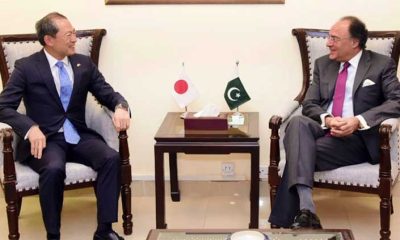
 Business3 months ago
Business3 months agoFinance Minister Aurangzeb discusses bilateral cooperation with Japanese envoy
-
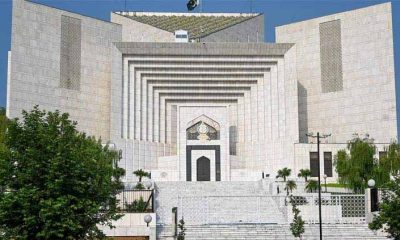
 pakistan3 months ago
pakistan3 months agoSC additional registrar submits response to show-cause notice in contempt case
-
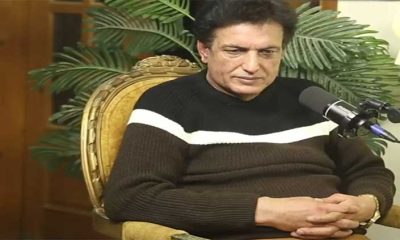
 Entertainment3 months ago
Entertainment3 months agoWhat Khalil-ur-Rehman Qamar feels about Mahira Khan
-

 Sports3 months ago
Sports3 months agoSwiatek powers into Raducanu clash as Fritz fires Melbourne warning
-

 Business3 months ago
Business3 months agoOil jumps on expectations new US sanctions to cut Russian supply
-

 Tech3 months ago
Tech3 months agoMicrosoft’s LinkedIn sued for disclosing customer information to train AI models
-
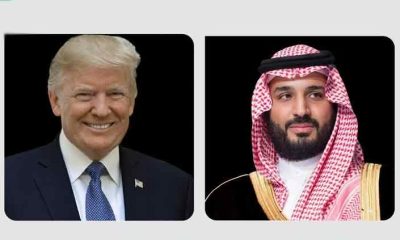
 World3 months ago
World3 months agoSaudi Arabia plans 600bn dollars in new US investment, trade over four years
-
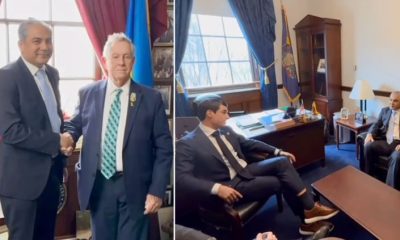
 pakistan3 months ago
pakistan3 months agoMohsin Naqvi sees new chapter in Pak-US relations under Trump











